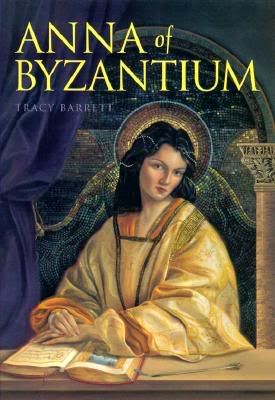
Anna of Byzantium
by Tracy Barrett
by Tracy Barrett
Cover: I really like this cover. It's like she's coming out of a mosaic into life; bringing the past into the present. Very illustrative of the time period and attractive.
Summary: From her seat in a lonely convent on the frontier of the Byzantine Empire, Anna Comnena looks back on her short life, and how she fell from empress to exile.
My Review: I love a good medieval story, so I was excited when I found this one on Amazon. A Young Adult novel that takes place in the Byzantine Empire? I'm there! I haven't read much about the Byzantines, and only know what I do from two medieval history classes in college. However, I've been a Young Adult reader my whole life, so I feel confident considering myself something of a connoisseur in that regard.
The book started out promisingly enough in the 12th century, describing daily life in a convent. On a personal note, here, I am always amazed at how people have slept through the night throughout history. Anna describes to us how the nuns wake up at various early hours to pray and complete daily chores, many of them before the sun has risen. How did everyone always wake up so early? How did they get enough rest on their meager bedding? Nowadays, it's hard for us to imagine sleeping in anything less than a completely silent, pitch-black room on a comfy pillow-top mattress... it never ceases to amaze me!
Moving on: Anna is sulking a little bit to be cooling her heels in the convent, so she asks permission to help in manuscript illumination. In doing so, she will have access to all the writing materials necessary to complete her own history of her royal family in a book that would come to be known as The Alexiad, detailing the chivalrous life of her father, Alexius Comnenus.
Anna is remarkably literate, not merely for a woman, but for any person in the high middle ages. She knows passages from Homer and Virgil by heart, and is heavily influenced by the heroic age in her own writing. She believes she is born to rule and to set the empire to rights, after the machinations of her grandmother have upset the court. At the tender age of 13, Anna is capable of manipulating court politics to her advantage, knowing that any wrong move could end not only in losing her power, but result in a death sentence.
She is torn between the love she holds for her mother, who herself is a descendant of the royal Ducas family that was conquered by Alexius, and the power she knows her grandmother holds over her father and her weak brother, John. Here, too, Anna must choose whose influence she will want in her own court, and whose influence she will use to get there.
I liked that Anna holds unpopular opinions. She makes no apology for believing that she is destined by God to rule over others, and she goes so far as to plot the death of her brother by poison, believing she may be saving the empire in doing so. While our modern sensibilities balk at these extremes, a true medieval mind would have believed these ideas without doubt. I think it's important that Young Adult authors stick to this development, no matter the harsh realities, because finding the truth in history is what's ultimately important.
Nevertheless, I couldn't help the feeling that the story was ultimately "dumbed down," and incredibly truncated, to make it "easier to read" for intermediate readers, and I never really approve of that. For instance, Anna wishes that her maid address her as "Your Majesty," a title that was not in popular use until Henry VIII's time, when absolute rule came into being. I don't know what the proper title for a future empress would be (I know "Porphyrogenita" would be somewhere in there, in reference to the Byzantine royal color purple), but I know "Your Majesty" isn't it. That could have been an interesting detail in which to educate the readers, and instead Barrett glossed over it with an anachronism. Furthermore, there is very little description of architecture, background, and the physical aspects of what it would be like to live during the era. I don't think the reader gets enough historical information out of this historical novel: it's more like a character sketch.
In regards to the character: I feel like there wasn't enough of an arc in Anna to make the end satisfying. She goes from a confident ruler to a vengeful reject to a bored exile, and that's it. She doesn't come to personal terms with her mistakes, which results in the second half of the book dragging to a conclusion. It's as if, as soon as she loses the throne and her betrothed, there wasn't anything else to write about her, which would actually contrast with the author's vision.
Overall, this was a great historical figure to choose, and I applaud the author for choosing to write it as a Young Adult fiction, but it's more of a sketch than a novel.
Visit the author's website
Buy this book on Amazon








The banana have many properties like the potassium and some vitamin too. that is why i prefer to use the bananas frequently in my recipe. and i love the flavour too. Even power the tissues, muscles and bones that can help with the sexual performance too.
ReplyDeletebuy viagra